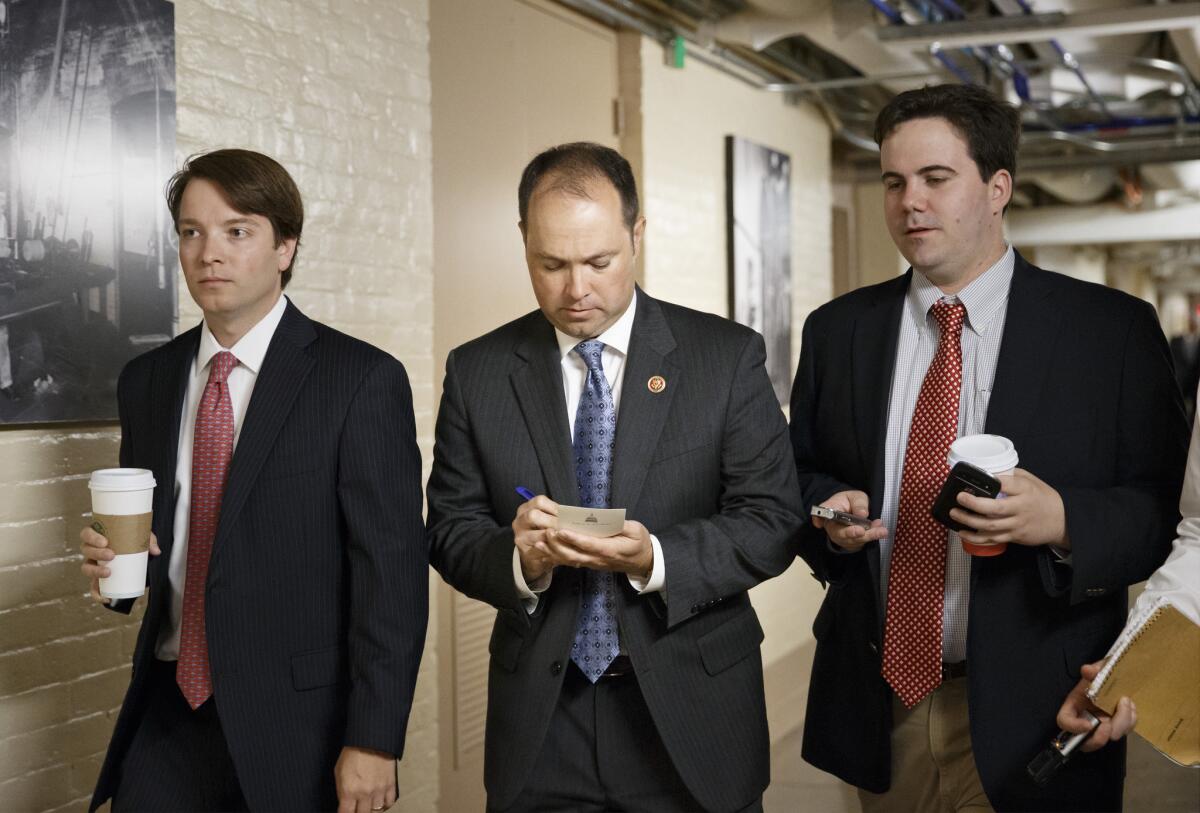Race for House Republican whip goes down to the wire

- Share via
Reporting from Washington — The job of a House whip is largely about knowing how the vote count stands. Just trying to win the job shows how difficult the road ahead might be for the three candidates working to line up support.
There are 233 Republicans in the House who can participate in Thursday’s secret ballot. But based on the projections the candidates offer, you’d think it were more.
Allies of Rep. Steve Scalise (R-La.), increasingly viewed as the front-runner, say he’s very near the 117 votes he needs to secure the House’s No. 3 job on the first ballot. Rep. Peter Roskam (R-Ill.), currently the chief deputy whip, has 90 “solid” commitments, aides say. And second-term Rep. Marlin Stutzman (R-Ind.) said Wednesday that he had 50 votes in hand, and saw half as many still up for grabs.
“I trust them,” Stutzman told reporters of his own count.
All three hopefuls made a new pitch to their colleagues Wednesday morning at a candidate forum in the basement of the Capitol. So too did Rep. Kevin McCarthy, who is all but certain to leave the whip job and win promotion to majority leader, as did his long-shot challenger for that post, Rep. Raul R. Labrador (R-Idaho).
Members from across the ideological spectrum said the choice for whip was a tough one that required them to choose from among friends in a race no one expected until a week ago.
All three candidates pledged their commitment to GOP principles and promised to work to bridge the occasional divides within the party that have sometimes resulted in legislative setbacks.
The race may turn on personal relationships as much as on geography or ideology.
“It’s intensely personal,” said Rep. Tom Cole (R-Okla.), a Scalise supporter. “We all know one another in a way that the average voter never knows a candidate. They define themselves by their votes, their actions. You’ve watched them on the floor. You’ve heard them speak. So the intimacy of the election is tremendous. And it makes it very hard to pick.”
“We’re having a family discussion,” said Rep. Richard Hudson (R-N.C.), who is supporting Roskam. “I think you’ve got folks who have a lot of opinions about the direction we ought to be taking, and this is a great way for them to voice that.”
The whip candidates continued to make their case in one-on-one and group sessions, including one with a delegation of Republicans from Southern states. They’ll get one last chance Thursday afternoon when members gather in the ornate hearing room used by the Ways and Means Committee, in an office building just south of the Capitol. Then lawmakers will mark their ballots and give them to one of a handful of colleagues serving as tally clerks.
If Stutzman is right about his total, the race will probably require a second ballot to choose a winner. Roskam, in particular, has focused on lining up votes from those who have committed to supporting another candidate on that first ballot.
Roskam is also working to overcome the view of some Republicans that the defeat of Majority Leader Eric Cantor (R-Va.) by a conservative primary challenger last week gives the party a chance to shake up the leadership team and give red-state members a seat at the table. He’s said that the whip’s race should be about choosing the person most capable of doing the job, not about checking a geographical box.
Hudson said that even though Roskam has had a senior role as chief deputy whip, he would be “his own man” if moved up the ladder.
“Any time you have a shuffle you get fresh voices,” Hudson said. “Peter’s going to do things the way Peter will want to do things as whip. McCarthy’s going to be a different leader than Cantor.”
Cole, meanwhile, said Scalise had already been tested in his role as chairman of the Republican Study Committee, a large group of the conference’s more conservative members.
“The RSC chairman is almost an adjunct member of leadership,” he said. “He manages to reach into some areas that we probably need shoring up, both geographically and ideologically. And he’s got great political skills.”
Ultimately, Cole said, the race has been good for the party, whoever wins.
“If you can’t win the whip’s job, then you’re not the right person to be whip,” he said. “If Peter wins, he’ll be a better whip for having gone through the race. If Scalise wins, he’s clearly the right guy to have done it.”
Follow @mikememoli for more news out of Washington.
More to Read
Sign up for Essential California
The most important California stories and recommendations in your inbox every morning.
You may occasionally receive promotional content from the Los Angeles Times.














